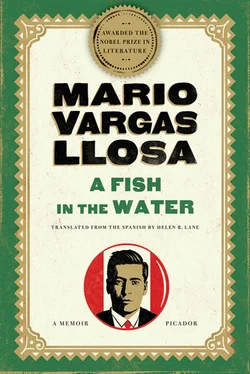Mario Vargas Llosa - A Fish in the Water - A Memoir
Здесь есть возможность читать онлайн «Mario Vargas Llosa - A Fish in the Water - A Memoir» весь текст электронной книги совершенно бесплатно (целиком полную версию без сокращений). В некоторых случаях можно слушать аудио, скачать через торрент в формате fb2 и присутствует краткое содержание. Год выпуска: 2015, Издательство: Macmillan, Жанр: Биографии и Мемуары, на английском языке. Описание произведения, (предисловие) а так же отзывы посетителей доступны на портале библиотеки ЛибКат.
- Название:A Fish in the Water: A Memoir
- Автор:
- Издательство:Macmillan
- Жанр:
- Год:2015
- ISBN:нет данных
- Рейтинг книги:3 / 5. Голосов: 1
-
Избранное:Добавить в избранное
- Отзывы:
-
Ваша оценка:
- 60
- 1
- 2
- 3
- 4
- 5
A Fish in the Water: A Memoir: краткое содержание, описание и аннотация
Предлагаем к чтению аннотацию, описание, краткое содержание или предисловие (зависит от того, что написал сам автор книги «A Fish in the Water: A Memoir»). Если вы не нашли необходимую информацию о книге — напишите в комментариях, мы постараемся отыскать её.
is a twofold book: a memoir of one of Latin America's most celebrated witers, beginning with his birth in 1936 in Arequipa, Peru; and the story of his organization of the reform movement which culminated in his bid for the Peruvian presidency in 1990.
A Fish in the Water: A Memoir — читать онлайн бесплатно полную книгу (весь текст) целиком
Ниже представлен текст книги, разбитый по страницам. Система сохранения места последней прочитанной страницы, позволяет с удобством читать онлайн бесплатно книгу «A Fish in the Water: A Memoir», без необходимости каждый раз заново искать на чём Вы остановились. Поставьте закладку, и сможете в любой момент перейти на страницу, на которой закончили чтение.
Интервал:
Закладка:
I was born on the second floor of the house on the Bulevar Parra, where my grandparents lived, early on the morning of March 28, 1936, after a long and painful labor. My grandfather sent a telegram to my father, by way of Panagra, giving him the news of my arrival in the world. He did not answer, and he also failed to answer a letter that my mother wrote telling him that I had been baptized with the name of Mario. Since they didn’t know whether he hadn’t replied because he didn’t want to or because the messages hadn’t reached him, my grandparents asked a relative who lived in Lima, Dr. Manuel Bustamante de la Fuente, to look him up at Panagra. The doctor went to speak with him at the airport, to which my father had returned after several months’ stay in Bolivia. His reaction was to demand a divorce. My mother consented, and it was granted, on the grounds of mutual incompatibility, through the intermediary of lawyers, without the former spouses having to see each other face to face.
This first year of my life, the only one I spent in the city where I was born and about which I remember nothing, was a hellish year for my mother as well as for my grandparents and the rest of the family — a typical middle-class family of Arequipa, in all that expression implies as regards their conservatism, their traditionalism, and their narrow outlook on life — who shared the shame of their abandoned daughter, now the mother of a fatherless child. In Arequipa society, prejudiced and afraid of its own shadow, the mystery of what had happened to Dorita caused talk. My mother didn’t venture outside the house, except to go to church, and devoted herself to caring for the newborn baby, unfailingly aided by my grandmother and my Mamaé, who made this first-born baby of the new generation their pampered pet.
A year after I was born, my grandfather signed a ten-year contract with the Said family to go off to cultivate landed properties — the Saipina hacienda — that they had just acquired in Bolivia, near Santa Cruz, where the Saids wanted to introduce cotton growing, a crop that my grandfather had successfully cultivated in Camaná. Although I was never told as much, I could never rid myself of the idea that that unfortunate story of their elder daughter, and the enormous trouble caused them by my mother’s abandonment and divorce, had driven my grandfather to accept a job that got the family out of Arequipa, never to return. “It was a great relief to me to go to another country, to another city, where people would leave me in peace,” my mother says in reference to that move.
The Llosa family moved to Cochabamba, at that time a more livable city than the tiny, isolated little town of Santa Cruz, and settled in an enormous house on the Calle Ladislao Cabrera, in which my entire early childhood was spent. I remember it as a paradise. It had an entry hall with a tall curved roof that sent back the echo of people’s voices, and a patio with trees where, with my cousins Nancy and Gladys and my school chums from La Salle, we reenacted the Tarzan films and the serials we saw on Sundays, after the Mass held at school, and at the matinees at the Cine Rex. Around the front patio was a pillared terrace with sun awnings and rocking chairs where Grandpa Pedro, when he was not out at the hacienda, used to take his afternoon nap, swaying back and forth, with snores that used to make me and my two cousins almost die laughing. There were two other patios, one paved with tiles and the other with beaten earth, where the laundry and the servants’ quarters were located, along with pens in which there were always hens and, at one time, a baby goat brought from Saipina which my grandmother finally adopted. One of the first terrors of my childhood was that kid, which when it worked itself loose from its tether used to attack everything that got in its way, causing a great hubbub in the house. At another period I also had a chatterbox of a parrot that imitated the loud fits of stamping my feet that frequently came over me and screeched, in exactly the same way as I did: “Graaanny! Graaanny!”
The house was huge, but we all had our own places in it, with our own rooms: my grandma and grandpa, Mamaé, my mama and I, my Aunt Laura and my Uncle Juan and their daughters Nancy and Gladys, Uncle Lucho and Uncle George, and Uncle Pedro, who was studying medicine in Chile but who came to spend his vacations with us. Besides all of them, there were the cook and the servants, who never numbered less than three.
In that house I was pampered and spoiled to extremes that made a little monster out of me. The pampering was thanks to the fact that I was the grandparents’ first grandchild and the aunts’ and uncles’ first grandnephew, and also because I was the son of poor Dorita, a fatherless little boy. Not having a papa, or rather, having a papa who was in heaven, wasn’t anything that tormented me; on the contrary, it conferred on me a privileged status, and the lack of a real father had been compensated by any number of surrogates: my grandpa and my uncles Juan, Lucho, Jorge, and Pedro.
My wild pranks made my mama enroll me at La Salle when I was five, a year before the one recommended by the order’s brothers. I learned to read shortly thereafter, in Brother Justiniano’s class, and this — the most important thing that happened to me before that afternoon on the Eguiguren embankment — calmed down my tempestuous behavior, for the reading of books for children —Billikens, Penecas— and all sorts of little stories and tales of adventure became an exhilarating pastime that kept me quiet for hours and hours. But reading did not keep me from playing games, and I was capable more than once of inviting my whole class to have tea at my house, excesses that Granny Carmen and Mamaé, whom I hope, if God and heaven exist, have been adequately rewarded, would tolerate without a word of protest, carefully preparing slices of buttered bread, cold drinks, and coffee with milk for this swarm of children.
The entire year was one big party. It included outings to Cala-Cala, going to the main square to eat Salta-style meat pies on the days when there were open-air military band concerts, going to the movies, and playing at friends’ houses — but there were two holidays that stood out, for the excitement and the happiness they brought me: Carnival and Christmas. For Carnival, we filled balloons with water beforehand — it was the custom — and when the day arrived, my cousins Nancy and Gladys and I bombarded the people passing by on the street and stole peeks, bedazzled, at our uncles and aunts as they dressed in fantastic costumes to go to masked balls. The preparations for Christmas were meticulous. Granny and Mama sowed wheat seeds in special containers for the Nativity scene, a laborious structure brought to life with little plaster figures of shepherds and animals that the family had brought from Arequipa (or that had perhaps been brought from Tacna by Granny). Decorating the tree was a fantastic ceremony. But nothing was as exciting as writing to the Baby Jesus — who had not yet been replaced by Santa Claus — little letters about the presents that I wanted him to bring on the twenty-fourth of December. And getting into bed that night, trembling with eagerness, with my eyes half-closed, wanting and at the same time not wanting to see the Baby Jesus steal into my room with the presents — books, many books — that he would leave at the foot of the bed and that I would discover the next day, my chest bursting with excitement.
While I was in Bolivia, up until the end of 1945, I believed that the Baby Jesus brought toys, and that storks brought babies from heaven, and not one of what my confessors called bad thoughts ever crossed my mind; they made their appearance later, when I was living in Lima. I was a mischievous child and a crybaby, but as innocent as a lily. And devoutly religious. I remember the occasion of my first communion as a great event: the preparatory classes given us every afternoon beforehand by Brother Agustín, the principal of La Salle, in the chapel of the school, and the moving ceremony — with me dressed in white for the occasion and the entire family present — in which I received the host from the hands of the bishop of Cochabamba, an imposing figure enveloped in royal purple vestments whose hand I hastened to kiss when I met him on the street or when he appeared at the house on Ladislao Cabrera (which was the Peruvian consulate as well, a post my grandfather had assumed ad honorem ). And I remember as well the breakfast with hot chocolate and sweets made of almonds and candied fruit which they gave to those of us who had celebrated our first communion, and our families, in the patio of the school.
Читать дальшеИнтервал:
Закладка:
Похожие книги на «A Fish in the Water: A Memoir»
Представляем Вашему вниманию похожие книги на «A Fish in the Water: A Memoir» списком для выбора. Мы отобрали схожую по названию и смыслу литературу в надежде предоставить читателям больше вариантов отыскать новые, интересные, ещё непрочитанные произведения.
Обсуждение, отзывы о книге «A Fish in the Water: A Memoir» и просто собственные мнения читателей. Оставьте ваши комментарии, напишите, что Вы думаете о произведении, его смысле или главных героях. Укажите что конкретно понравилось, а что нет, и почему Вы так считаете.












